In Roman mythology, Venus is the goddess of love, beauty, and fertility. She is often associated with the Greek goddess Aphrodite and is considered one of the major Roman deities widely worshiped in ancient Rome.
The worship of Venus was an integral part of Roman religious practices, and temples were dedicated to her in various locations. Festivals, such as the Veneralia, were held in her honor. The influence of Venus extended beyond mythology and religion, as she became a symbol of love and beauty in Roman culture.
Table of Contents
Who Was Venus?
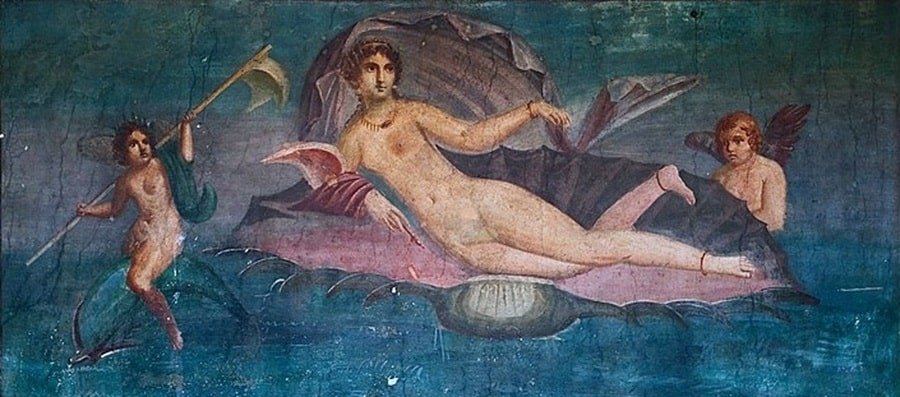
Venus, in Roman mythology, was the goddess of love, beauty, and fertility. She was considered the counterpart to the Greek goddess Aphrodite. Venus was born from the sea foam after the Titan Cronus (Saturn in Roman mythology) castrated his father Uranus and threw his genitals into the sea. According to Roman mythology, Venus emerged from the sea fully grown and beautiful.
The story of Venus is deeply intertwined with various myths and legends, and her role extends beyond love and beauty. She was believed to have played a significant part in the founding of Rome. According to the Roman poet Virgil’s epic poem “Aeneid,” Venus was the mother of Aeneas, a Trojan hero, who later became one of the legendary founders of Rome.
She was often depicted in art and literature as a beautiful woman, and she became a symbol of love, desire, and fertility. Temples and festivals were dedicated to her worship, and she held a prominent place in the religious and cultural life of ancient Rome. The planet Venus is named after this goddess due to its brightness and beauty in the night sky.
Roman Goddess of Love and the Mother of Rome
Venus is the personification of everything related to passion. She is often depicted nude, but the passion wasn’t necessarily only related to something like sexual love. Passionate love can apply and be shown in a lot of forms. Think about motherly love, but also sexual love. But, if you would ask any of the ancient Romans you would probably not get a consensus answer about the thing that Venus represented.
Indeed, there is barely an agreed-upon series of consistent character traits for her, almost to the point where it seems like she is a separate character in different myths.
Venus was herself quite the flirt. Her fluid sexuality was embraced by male and female lovers alike. She was also the guardian of lovers and prostitutes and a major figure in Roman religion. Venus was the adapted form of an ancient Greek goddess, Aphrodite, with whom she shared a mythological tradition.
During the Punic Wars of the second and third centuries BC, Venus was thought to lend her assistance to the Romans and ensure their victories over the Carthaginians. Her importance as a figure of worship peaked shortly thereafter, though she continued to be venerated until the rise of Christianity in the fourth century. So in total, she enjoyed a high relevance for about 700 years.
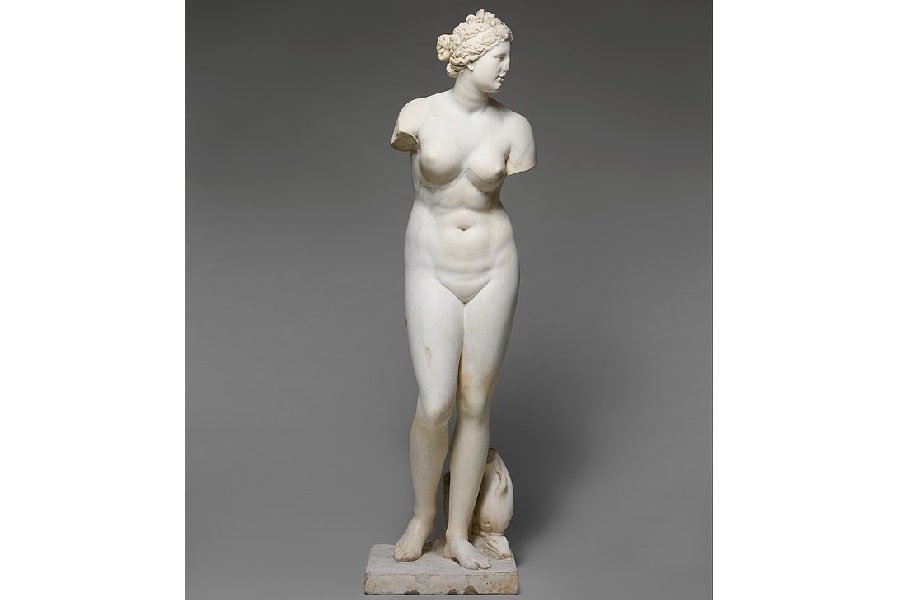
READ MORE: How Did Christianity Spread: Origins, Expansion, and Impact
Venus and Agriculture
Although she is now mostly recognized as the Roman goddess of love, she is also associated with growth and the cultivation of fields and gardens. The sources that explain why this is the case are, however, very limited. Maybe a good explanation can be that the growing of crops carries within them a certain form of fertility. Without fertile soil, pollination, and (humanly) love, plants won’t grow.
One of the earliest links between Venus and agriculture comes, weirdly enough, about 18.000 years before Venus became linked to agriculture.
The Birth of Venus
If we follow the myths as described in Hesiod’s Theogony and the poetry in Ovid’s Metamorphoses, the birth of Venus was a result of the defeat of a primordial god by the name of Uranus. Uranus was killed by his own children, who are better known as the Titans.
So how was he defeated? Well, he was castrated. Indeed, making Venus was a result of the sea foam that arose after Saturn castrated his father Uranus and his blood fell to the sea.
There are more deities believed to be born from this very castration. For example, the Furies also enjoyed such a privilege. This also means that Venus is much older than many of the other gods in the Roman pantheon, including Jupiter, the king of the pantheon and god of the skies.
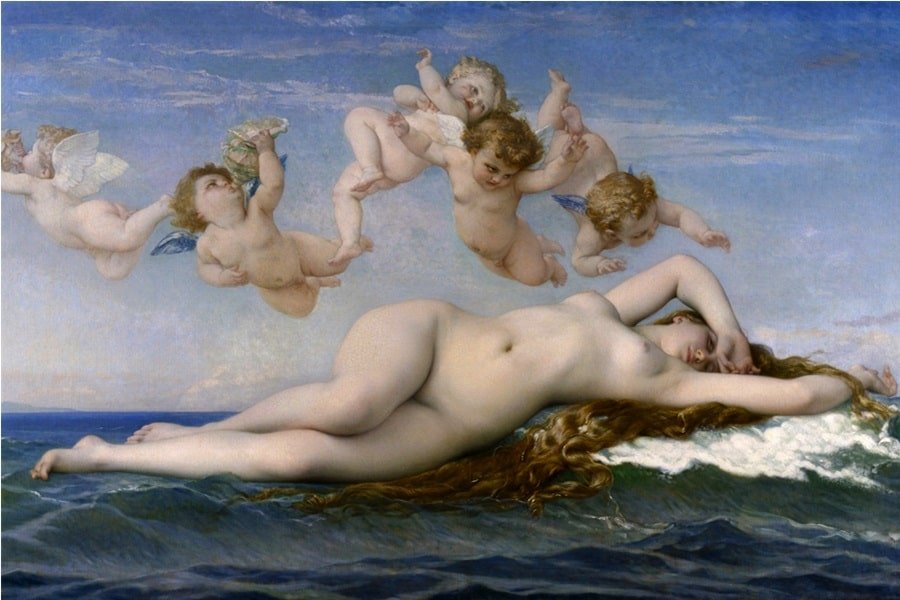
Lovers of Venus
As the goddess of love, it’s not hard to imagine that Venus had little trouble finding lovers herself. Many Roman gods had multiple lovers and affairs, and so did lucky Venus. Her lovers can be divided into two categories: the divine lovers and the mortal lovers.
Divine Lovers: Vulcan and Mars
The fertility goddess had two main divine lovers: her husband Vulcan and another Roman god by the name of Mars. So the saying ‘men are from Mars, women are from Venus’ has some deep roots in Roman mythology.
Her relationship with Mars was, however, more of a love affair within Venus’ marriage with Vulcan. Also, it would go a bit too far to call the marriage between Vulcan and Venus a relationship that involved a lot of love.
That is to say, some myths say that the love affair between Venus and Mars was promoted by Vulcan himself, who cunningly trapped them in bed with a net. Indeed, even the myths of the most ancient Roman gods tell us that marriage doesn’t have to equal love.
With Mars, she had a couple of children. Venus gave birth to Timor, the personification of fear who accompanied Mars on the battlefield. Timor had a twin with the name of Metus, the personification of terror.
Apart from these two sons, Venus had several daughters with Mars. First of all, Concordia, the goddess of harmony and concord. Also, she gave birth to the Cupids, who were a collection of winged love deities who represented the different aspects of love.
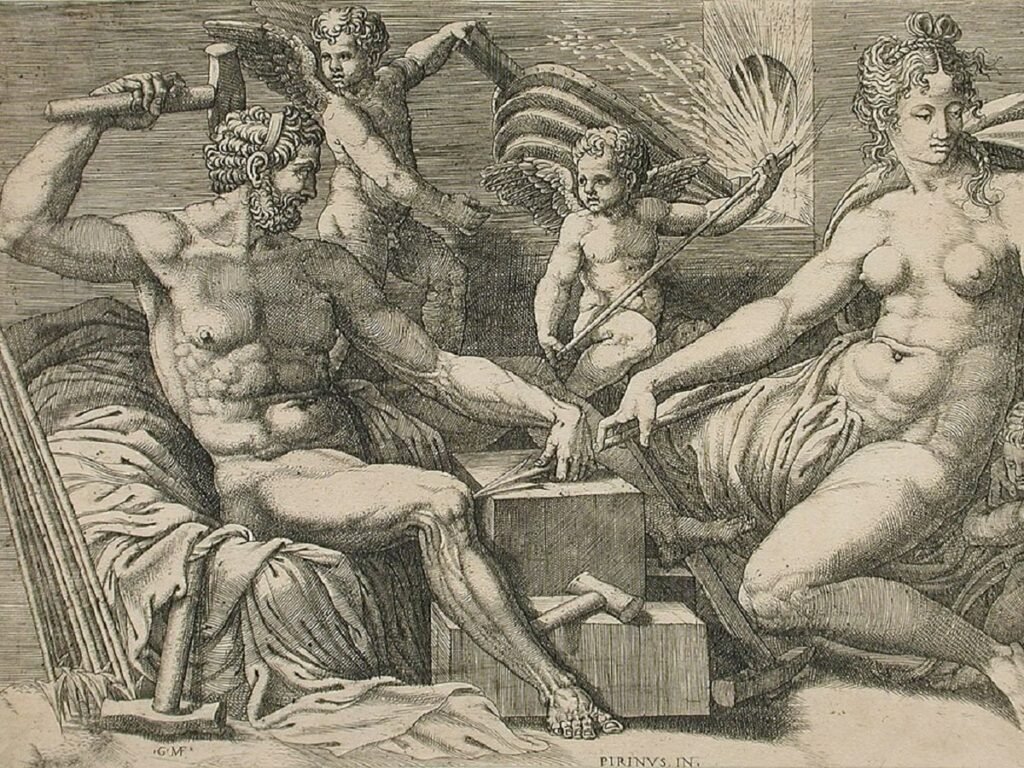
Other Divine Children of Venus
Besides the children she bore with Mars, there are a couple of other deities that are ascribed to Venus. First, she is seen as the mother of the minor deity Priapus, a fertility god. The father of Priapus is believed to be Bacchus.
Bacchus was a Roman god with whom Venus had more than one child. For example, the Graces, who are the personifications of grace and beauty, were also believed to be children of the pair. Together with the Cupids, the Graces would represent the persuasion of romance, love, and seduction.
So, who was this Bacchus guy? And why was he able to seduce the goddess of love? Well, Bacchus was the god of wine and the feeling of being drunk. He was the son of Jupiter and Semele. Jupiter adopted him when he killed Bacchus’ mother with one of his thunderbolts.
READ MORE: Who Invented Wine? Unveiling the Ancient Origins
Venus’ Mortal Lovers
Venus had a couple of mortal lovers as well. The most famous go by the names of Anchises and Adonis. The former is also known as the Trojan Prince of Dardania.
Venus used a pretty nifty trick to seduce him. She disguised herself as a Phrygian princess and seduced him. Only after nine months, Venus revealed her divine identity. She presented Anchises with their son Aeneas.
Being seduced by the Venus goddess is obviously quite a good brag. But, Venus warned Anchises never to brag about their affair. If he still did brag about it, he would be struck by a thunderbolt of Jupiter. Unfortunately, Anchises did brag and was crippled by Jupiter’s bolt. Well, at least he got to brag to his mates about dating a goddess.
Adding to the list, Venus was also believed to be the lover of King Butes, with whom she had a son named Eryx. Still, she wasn’t done yet after Butes, since she also had a son with another mortal man. The son is named Astynous and Phaethon is believed to be the father.
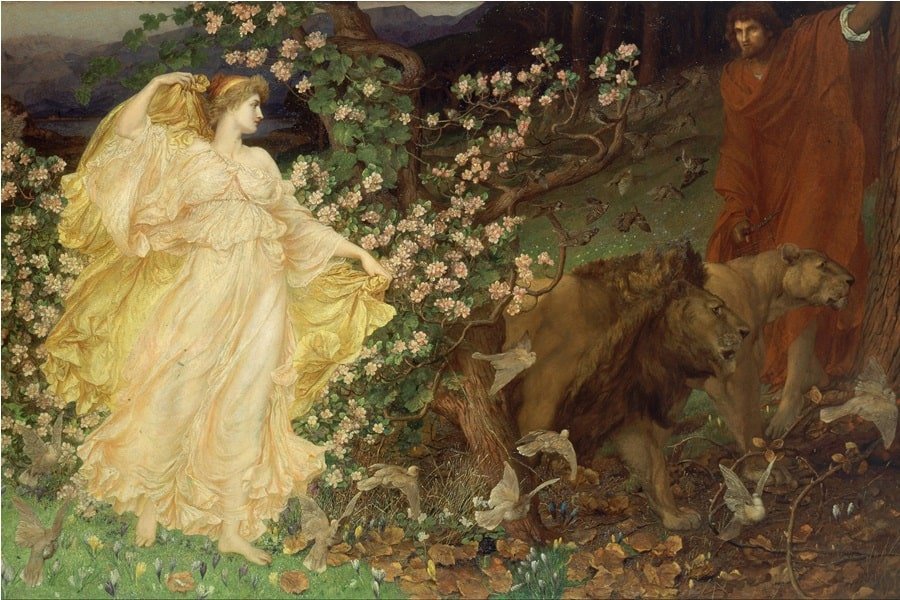
Worshiping Venus, the Roman Goddess of Love and Fertility
Venus enjoyed many titles and was worshiped for a variety of things. The Roman temples that were built for Venus referred to her by various names.
The first known temple to Venus relates to Venus Obsequens, which translates to indulgent Venus. The magnificent temple was erected in 295 BC and legend has it that the temple was funded by the fines that were imposed on Roman women or people in general for sexual misdemeanors.
The second form in which she was honored was Venus Verticordia: the Changer of Hearts. Being able to change hearts only solidifies her claim as the goddess of love. Venus Verticordia was the subject of the first Venus temple, built in Latium on the 18th of August 293 BC. Under the same name, she was protecting people against sins.
Although it is generally believed that Venus is necessarily based on Aphrodite, the inhabitants of ancient Rome only found that out in the year 217 BC. This was the year when the first temple for Venus Erycina was built by the Greeks, which honored the Roman interpretation of their goddess Aphrodite.
Besides that, Venus was also associated with another Roman god by the name of Cloacina, who was the goddess of cloaca maxima. A somewhat dubious honor, since the cloaca maxima is the main sewerage system of ancient Rome.
Lastly, Venus was also beloved by the Roman state leaders and Roman people. Julius Caesar and Augustus were some of the leading figures in this. Because of their passion for Venus, she even became honored as the mother of Rome or Venus Genetrix. Julius Caesar was the first to erect a temple for the new mother of Rome.
Some other titles that are common for Venus are Venus Felix (the happy Venus), Venus Victrix (victorious Venus), or Venus Caelestis (heavenly Venus).

Honoring Venus
The temples of Venus had a wide variety of uses, and the most notorious one came from Julius Caesar himself. Not only did he regard Venus as the mother of Rome, but he was also believed to be a descendant of her. The mortal man that inspired the name of your favorite salad claimed to be the son of Trojan hero Aeneas, one of Venus’ children.
Because Caesar was so fond of Venus, he would widely use her image in, for example, civic architecture and as a face on the ancient Roman coins. The figure of Venus in general became symbolic of power throughout the Roman Empire.
Festivals of Venus
April was the month of Venus. It is the beginning of the spring, and therefore the beginning of a new year of fertility. The most well-known festivals to honor Venus were also held in April.
On April the 1st, a festival was held in honor of Venus Verticordia called Veneralia. On the 23rd, Vinalia Urbana was held: a wine festival belonging to both Venus and Jupiter. Vinalia Rusticia was held on the 10th of August. It was Venus’ oldest festival and associated with her form as Venus Obsequens. 26th of September was the date for the festival of Venus Genetrix, the mother and protector of Rome.
Roman Goddess Venus, Greek Goddess Aphrodite, or Mesopotamian Goddess Ishtar
The Roman goddess Venus is almost always mentioned in the same breath as the Greek goddess Aphrodite. People are usually more acquainted with the story of Aphrodite, which probably explains why almost any source directly refers to Aphrodite when talking about Venus.
Who Was Aphrodite?
Venus and Aphrodite are very much intertwined. Many of the names that are related to the Greek Aphrodite do occur in the stories of the Roman Venus.
The Greek Aphrodite is the goddess of love, beauty, and sexuality, and is attended by the Graces and Eros. Both these entities are frequently pictured at her side. Aphrodite is oftentimes viewed as having two halves that make up a whole: Aphrodite Pandemos, the sensual and earthy side, and Aphrodite Urania, the divine, celestial Aphrodite.
Ishtar: The Mesopotamian Deity that Inspired Aphrodite and Venus
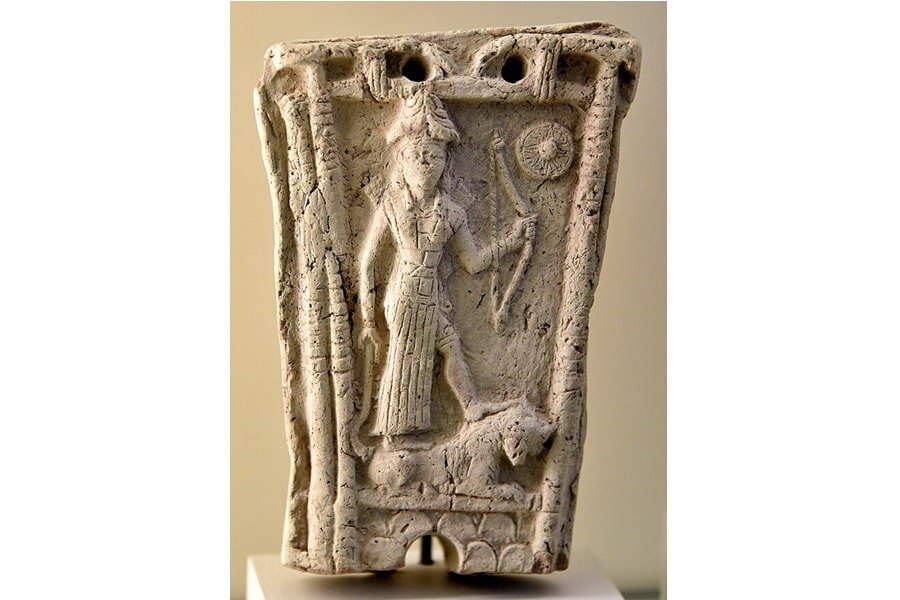
While the goddess Venus is believed to be based on the goddess Aphrodite, there is another layer to it. It comes in the form of Ishtar, a Mesopotamian goddess.
Ishtar was, like Venus and Aphrodite, one of the most important deities of Mesopotamia. Ishtar was the goddess of sexuality and war and was widely admired and equally feared. That’s because she was believed to represent both the heated passions of love and sex, as well as the passions of battle.
READ MORE: Ancient War Gods and Goddesses: 8 Gods of War from Around the World
Ishtar enjoyed a relatively big following. Various cults dedicated to the worship of Ishtar appeared as early as the 4th millennium BCE and quickly began to spread across the Middle East before reaching Greece by 3,000 BCE.
READ MORE: The Cradle of Civilization: Mesopotamia and the First Civilizations
However, when the deity Ishtar spread into Greece, her meaning changed quite a bit. That is to say, all the war connections were removed or changed. This has mainly to do with the fact that ancient Greeks were quite fond of gender roles, or at least had a different view on them when compared to the territories that we today know as Iraq, Iran, Turkey, and Syria.
The Greeks saw war and battle as a role solely for men. Therefore, the Greeks created Aphrodite: the goddess that was just related to love and beauty. She did, however, date a war-related deity every so often. Yet, the idea was that she avoided direct war as much as possible.
The Romans borrowed elements of Greek mythology and incorporated them into their own. However, Venus had a few new traits that Aphrodite did not.
Venus after the Fall of the Roman Empire
With the fall of the Roman Empire, or Roman state, in the late 5th century, the importance of Venus also vanished. That doesn’t mean that her story isn’t relevant anymore, since many myths carry within them a valuable lesson.
Conclusion
Venus was a prominent goddess in Roman mythology, associated with love, beauty, and fertility. As the Roman counterpart to the Greek goddess Aphrodite, Venus held a central role in the religious and cultural life of ancient Rome. She was believed to have emerged from the sea foam and played a significant part in the founding of Rome, being considered the mother of Aeneas, a legendary Trojan hero.
Venus was often depicted as a beautiful woman and served as a symbol of love and desire. The worship of Venus included temples and festivals dedicated to her, reflecting her importance in Roman society. Overall, Venus remains a compelling figure in mythology and continues to be a symbol of love and beauty in various cultural contexts.